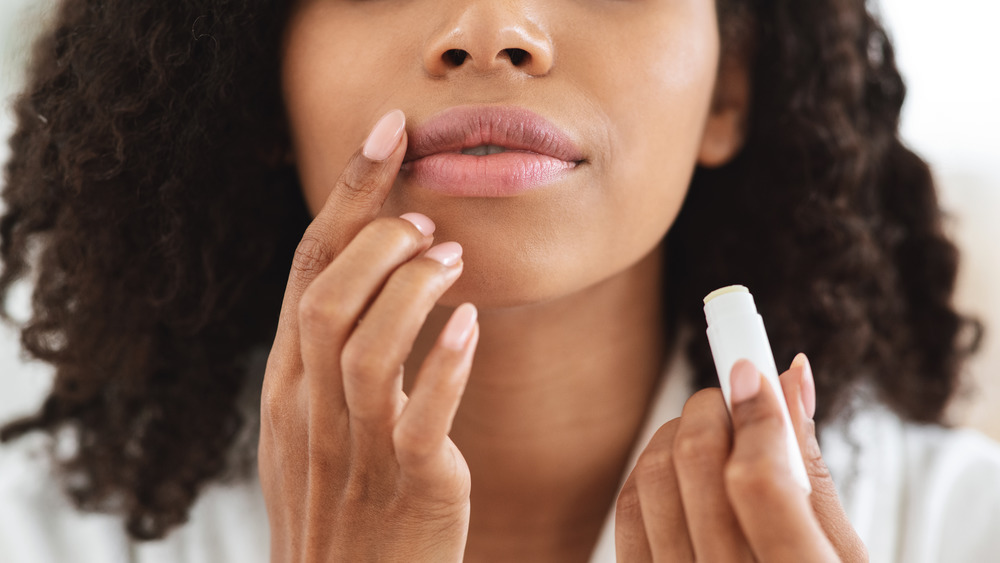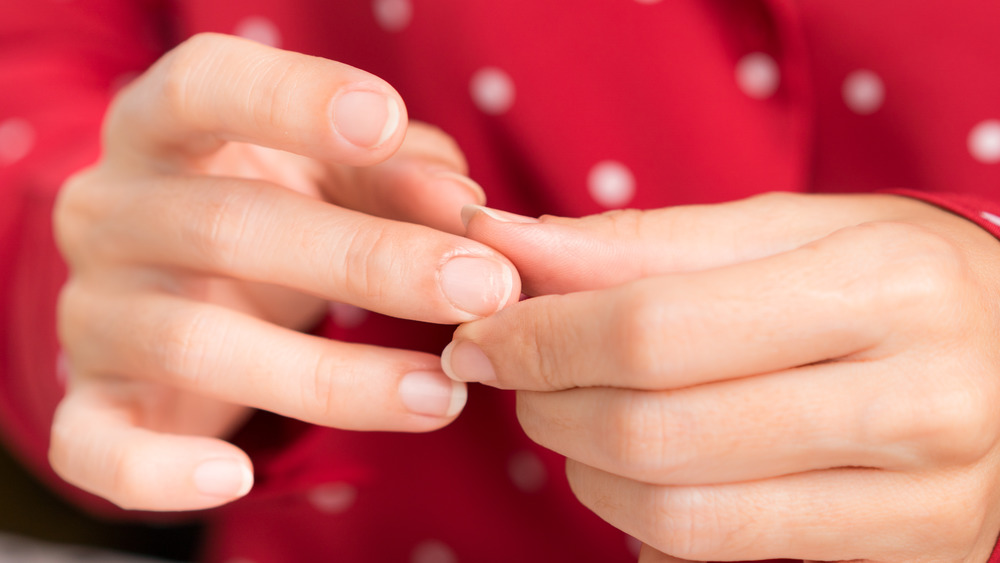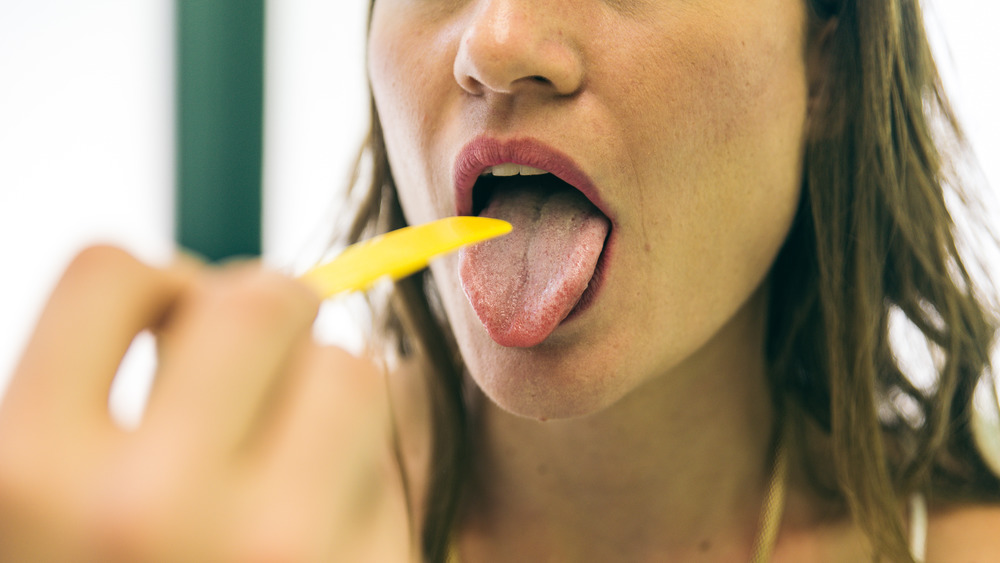Sneaky Signs You're Probably Not As Healthy As You Think
You may consider yourself healthy, but your body may be saying something different. Chapped lips, cold feet, or some stinky breath may not seem like such a big deal, but each of these simple symptoms could be your body's way of warning you that something's wrong. Many of us don't think twice when it comes to many of these seemingly minor issues, but when you stop and think about it, any change to your body means something.
Luckily, a lot of the time, there are pretty easy fixes for these things — and oftentimes it includes eating. Yum! "Each change in our health starts from within," registered dietitian Gabrielle Tafur told Health Digest. "And therefore, it is crucial to put an emphasis on our dietary patterns to maintain our health on a daily basis."
On the other hand, if eating some leafy greens isn't enough to soothe your symptoms, it may be in your best interest to have a discussion with your doctor. These clues could be the early start of something much more serious. Which clues should you watch out for? Read on for a few sneaky signs that show you're probably not as healthy as you think.
You always snore when you're sleeping
According to Johns Hopkins Medicine, a quarter of Americans snore on a nightly basis. While this may seem like an innocent enough way of knowing you're getting some deep sleep, it could be a sign of a more serious issue — and one that many people are born with.
One common cause of snoring is due to a deviated septum. This is when the cartilage that's located in the center of a person's nose is skewed more to a certain side. Many times, it's not even noticeable until someone begins snoring. "When the septum deviates to one side, it creates an uneven airflow through your nasal passages that turbulent air can 'rattle' the nasal tissue resulting in snoring," sleep specialist Dr. Daniel Rifkin explained to Health Digest.
If you find that your own snoring is waking you up or even causing you to still be tired during the daytime, it may be time to see a doctor. Snoring can even sometimes be associated with high blood pressure, obstructive sleep apnea, and other health issues that warrant medical attention (via Mayo Clinic).
You bruise easily
Trauma to your skin may result in a bruise, but if you find you're getting bruises more often than not, they may be a cause of concern. "When they occur too often or too easily they can be signs of an underlying nutrient deficiency," registered dietitian Ella Davar told Health Digest. Luckily, there's an easy fix.
Simply adding vitamin C and vitamin K into your diet can help. These are essential when it comes to creating more collagen in the skin and strengthening the blood vessels, which means they'll be less likely to break and produce a bruise. To keep bruises at bay, Davar recommends "a daily intake of vegetables, fruits and berries." Even eating foods like seafood or dairy that contain vitamin B12 can help.
If you're still seeing black and blue even after upping your intake of these vitamins, there could be something else going on. "Liver disease and certain cancers also increase the risk of bruising," board-certified dermatologist Dr. Suzanne Friedler told us. "If someone suddenly starts bruising more than usual it warrants seeing a doctor."
Your skin is often itchy
We've all experienced an itch we just can't scratch. While it may seem like no big deal, board-certified dermatologist Dr. Suzanne Friedler told Health Digest that "itchy skin can also be a sign that something funny is going on."
First and foremost, itchy skin is often an indication of dry skin, so Dr. Friedler first recommends turning to a moisturizer for relief. However, it could also be helpful to take a look at what's around you if you find you're frequently itchy. Allergic reactions — even if you don't have a visible rash — can result from medications, bug bites, or simply something that rubbed against your skin.
If none of these reason seem to apply to your situation, turning to a dermatologist is the best way to go. Something more serious could be going on. "Itch can be a symptom of a low thyroid, severe kidney disease, or even cancer," Dr. Friedler said. A simple blood test can help rule out any of these long-term itchy issues.
Your feet or hands are always cold
Slippers are pretty popular, and they do a great job keeping our feet warm on chilly winter nights. "There are people who have cold feet in the winter, of course," Dr. Peter Lovato, a podiatrist based in northern Illinois, told Health Digest. But if your feet are still cold even in the summer heat, he said "that could be a sign of a vascular disease."
Vascular disease occurs when plaque builds up in your arteries. This blocks blood from being able to flow to different areas of the body. "Eventually, the parts of the body that are not receiving the blood will get colder," podiatrist Patrick McEneaney explained. If your feet change color when you're feeling chilly, that's the ultimate sign that you should see your doctor.
Another explanation for your cold feet could be that you're lacking iron or vitamin B12. These help carry blood cells successfully throughout the body. Without them, your body will "divert blood and prioritize the most vital organs like the heart, brain, and digestion, which leads to coldness in extremities — hands and feet," registered dietitian Ella Davar told us. It happens often to people who avoid animal products, like vegans, as well as dieters.
Your nails are splitting
If your manicures are becoming more and more unmanageable because of your splitting fingernails, it could be a sign that you need to speak to your doctor. "Any splitting that's been around for more than a month, is causing pain, or just doesn't look normal would be cause to visit your podiatrist," Dr. Patrick McEneaney, a podiatrist with Northern Illinois Foot & Ankle Specialists, exclusively told Health Digest.
Cold winter weather can play a part in damaging your nails, but brittle nails could also be due to a vitamin deficiency — specifically iron or vitamin B. Luckily, these are very easy nutrients to add into your existing diet. "Things that can improve this condition are fruit, leafy greens, eggs, nuts, or whole grains," Dr. McEneaney said. If you're not into these foods, another easy way to incorporate vitamin B into your day to day is by taking a daily dose of Biotin (via Healthline).
You're always bloated
It's something we've all experienced at least once in our lives: that feeling when your clothes are suddenly pressed up against your body, and you just don't feel your best. You're bloated, and it's enough to bother anybody. Blech! Many people tend to blame bloat on whatever they're eating, but if you're bloated all the time, that may actually be your body's way of telling you to reach for more water. "Watch for signs of dehydration to combat the bloating," registered dietitian Gabrielle Tafur recommended to Health Digest. "And restore balance with adequate hydration."
When you're lacking water, your body retains the liquid that it does have and, in turn, makes you bloated. In addition, the electrolytes in your body could be out of balance. Luckily, there's an easy fix. "This can be done with the consumption of water-based beverages with added electrolytes," Tafur recommended. "Cucumber water or coconut water does wonders!"
Your eye often twitches
It's easy to get annoyed by an occasional pesky eye twitch. While these twitches don't have much of an effect on our bodies — other than making us extremely frustrated, of course — it still means something. Usually, eye twitches are your body's way of telling you that you are in need of a lot more sleep. However, if you find them happening more often than not, it may be time to have a discussion with your doctor. "They could be a sign of multiple sclerosis in rare cases," Dr. Andrea Paul, physician and medical advisor to Illuminate Labs, told Health Digest.
Multiple sclerosis (MS) is a disease that affects the central nervous system.. "In MS, the immune system attacks the protective sheath (myelin) that covers nerve fibers and causes communication problems between your brain and the rest of your body," the Mayo Clinic explained. That said, it's important to examine all the underlying causes that could be contributing to your eye twitch. "People concerned about recurring eye twitches should speak to their doctor rather than try to diagnose it online," Dr. Paul added.
You're always reaching for lip balm
If you find yourself constantly digging through your purse or pocket for some lip balm during the dreary winter months, you may not think twice about it. However, it could be more than just the dry air that's causing your chapped lips. The sun, spicy foods, and even donning a long-wear lipstick on more than one occasion can cause cracking in your lips. "Cracked lips can also reveal a vitamin deficiency," registered dietitian Ella Davar explained to Health Digest.
If you want to curb dry and cracking lips, Davar recommends eating a diet that consists of iron and zinc. These can be found in veggies, nuts, legumes, and even in modest amounts of seafood and meats. For relief between mealtimes, "start off by treating your lips with a rich ointment lip balm with SPF," board-certified dermatologist Dr. Suzanne Friedler recommended. "If your lips don't improve, a dermatologist can help."
You often have bad breath
Many of us banish bad breath by popping a mint. However, this may just be masking the main cause of it. "Proper and routine dental hygiene are the first step," oral surgeon Dr. Jaclyn Tomsic told Health Digest. In fact, around 80 percent of bad breath is because of an issue in our mouths.
Bad breath can also be "a symptom of dehydration," said registered dietitian Gabrielle Tafur. When you're not drinking enough water, the bacteria in your mouth becomes unbalanced. And if too much bacteria starts to grow in there — yuck! — you need to find a way to rid your mouth of it instead of reaching for a breath mint. In addition to drinking water, another way to help your mouth feel fresh is with probiotic foods. Tafur recommends reaching for things like kombucha or kimchi to do away with bad breath.
If you still find yourself with stinky breath after altering your daily diet, there could be something else going on. "If this continues, it is important to see your doctor," Tafur said. "As this can indicate oral thrush or something else that may need correction with an antibiotic."
You sweat a lot
It makes sense to sweat in the summer heat, but if you're always sweating, this can be your body's way of telling you something serious is going on. "Excessive sweating can be a sign of an overactive thyroid or an early warning sign of a heart attack," podiatric physician Dr. Peter Lovato cautioned. It could also point to conditions ranging from menopause to tuberculosis, according to the Mayo Clinic.
When it comes to perspiration, there are a few warning signs that we all should watch for. If you find yourself feeling nauseous, lightheaded, or even have a headache coming on, these could be a cause for alarm. Suddenly becoming sweatier than usual may be another indication that it's time to see a doctor. Although sweating isn't usually a cause of concern, it's better to be safe than sorry. "You should see your doctor if the excessive sweating is impacting your life significantly," Dr. Lovato recommended.
You always feel sleepy
If you find yourself dozing off during the daytime, your body may be needing more sleep. Many people then turn to a nap — but still can't fall asleep. "It is common that fatigue and exhaustion are perceived as daytime sleepiness when, in fact, they are very different," sleep specialist Dr. Daniel Rifkin told Health Digest. Daytime sleepiness could mean that something else is going on.
A simple explanation could be the fact that diet isn't as balanced as it could be. Eating an adequate amount of fruits and veggies can give your body the micronutrients it needs over time to sustain energy throughout the day. "Green tea can be a wonderful addition to any diet, at most times of the day to provide a bit of antioxidants, as well as a minor caffeine boost to get through that mid-day slump," registered dietitian Gabrielle Tafur recommended.
If you still can't decipher the cause of your drowsiness, seeing a sleep specialist can help. Something like obstructive sleep apnea, a condition in which your airway become blocked off while dozing, commonly causes people to feel drowsy during the day and could be the reason you're not feeling rested (via Mayo Clinic).
You have a white coating on your tongue
An occasional white coating on your tongue may not be anything to worry about. However, this change in your mouth is still your body's way of telling you something is going on. "The white coating on the tongue is due to a buildup, a bacteria, and/or fungus," Dr. Andrea Paul, physician and medical advisor to Illuminate Labs, told us.
There are a few reasons why this could be happening. Dehydration, which is one of the most common, can cause cracks in your tongue, providing a spot for bacteria to easily build up. "A white tongue can also be caused by smoking," oral surgeon Dr. Jaclyn Tomsic told Health Digest.
While it's always best to add some extra water into your daily diet, there's an even better way of helping get rid of this white coating altogether. "The best way to treat this is with manual removal using a tongue scraper dental device, along with mouthwash," Dr. Paul revealed.
You have dry eyes
Dry eyes are enough to dampen anyone's day. Unfortunately, this is an issue that's even more common as we get older due to our body's decreased ability to create tears. However, eyes that are feeling constantly dry can eventually turn into major issues, like permanent damage to your peepers, so it's important to diagnose dry eyes right away.
While there are medications to treat dry eyes, other medications you're taking could actually be the culprit. "There are medications that can cause dry eyes as a side effect, like some antidepressants," Dr. Andrea Paul, physician and medical advisor to Illuminate Labs, revealed to us.
For even more protection, the Mayo Clinic recommends giving your eyes a break while working, using a humidifier, tear drops, and even moving your computer screen to a lower position so you won't have to widen your eyes to see what's on the screen.
You're always thirsty
If you're drinking an adequate amount of water yet still can't seem to quench your thirst, your body could be telling you that something more serious is going on. "Dehydration is the main sign of early diabetes," registered dietitian Ella Davar cautioned when speaking to Health Digest.
How exactly does this happen? Well, when your body isn't creating enough insulin, a simple sugar called glucose begins building up. This chemical creates the urge to empty your bladder more often, and, in turn, you'll want to drink more liquids to make up for it (via Mayo Clinic). However, no matter how much you drink, you'll still be feeling thirsty. If you find that drinking more isn't helping, it may be time to visit your doc. Davar advises us all to watch for "extreme thirst and the excretion of an excessive amount of diluted urine" when it comes to deciphering our thirstiness as a sign of diabetes.















